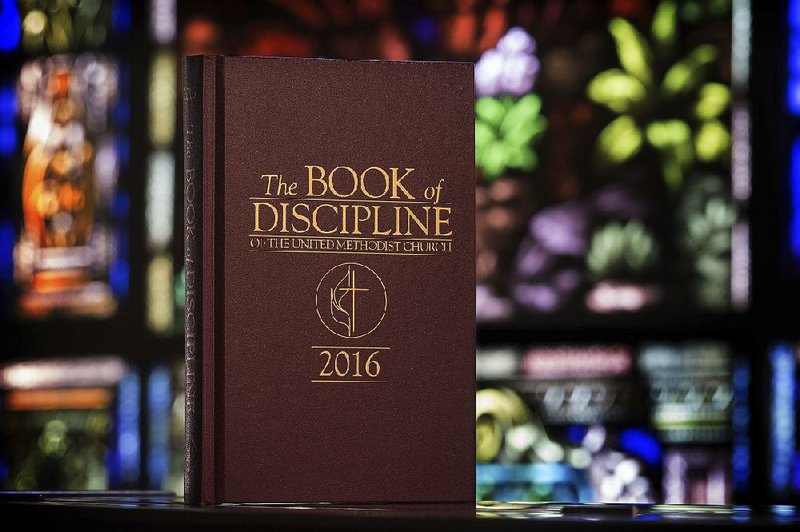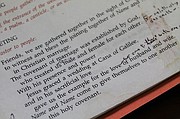The Rev. Ben Crismon, pastor of First United Methodist Church in Benton, has been reminding his 1,800-member flock in recent months about the history of the building where they attend worship services and the faith it represents.
"I tell them that our church has been around since 1856, on the same spot in downtown Benton, on the same piece of land, and that a lot of different names have hung out front," Crismon said. "I have [older congregation members] raise their hands and do a little proof positive that this has been something else before, and yet we have 160 years of faithful history, of ministry and sharing the Gospel."
Through a series of town hall-style sessions that began last summer, Crismon has reminded members of that history as the global denomination awaits the outcome of its special session of General Conference, a four-day gathering that begins today in St. Louis devoted to discerning how the faith should move forward with regard to its stance on human sexuality, and how that is worded in the church's law-and-doctrine manual, the Book of Discipline.
"The denomination has gone through a number of splits and uniting, and so this seems to be another step in the process," said the Rev. Britt Skarda, pastor of Pulaski Heights United Methodist Church in Little Rock. "I hate that it's over this [issue of sexuality]. I hate that we even have to disagree, but I just feel that it's [a] part of ... that march of history."
FORMED IN 1968
The United Methodist Church was formed in 1968 by the merging of the Evangelical United Brethren and Methodist faiths, and has around 12.6 million members worldwide. More than half of those members reside in the United States, where United Methodists are the second-largest Protestant denomination after Southern Baptists.
Arkansas lays claim to about 120,000 United Methodists, according to data from the church's 2018 annual conference.
At the faith's first General Conference in 1972, the words "the practice of homosexuality is incompatible with Christian teaching" were introduced into the Book of Discipline, along with language banning ordination of "self-avowed practicing homosexuals." The beliefs have since been debated at each General Conference, a gathering of the worldwide church body held every four years.
At the 2016 General Conference, the church again reached an impasse on how to address topics concerning sexuality, most namely the ordination of LGBT clergy members and allowing same-sex marriage. The church does not allow either, but those policies have not been widely enforced. Some who support the rights of LGBT members have officiated at same-sex weddings, and clergy members who have come out as lesbian, gay, bisexual or transgender after their ordination have not been cast out of the church. It was then that the special session was called for, to take place a year before the church's 2020 gathering.
Protestant denominations including the Episcopal, Presbyterian and Lutheran churches have already reached decisions about LGBT clergy and same-sex marriages, and have experienced fluctuations in the number of members and adhering congregations, and that's also expected to happen with the worldwide United Methodist denomination.
Karon Mann, the lay leader of the Arkansas Conference, said concerns brought up by members have mostly remained at the area or statewide level.
"The main emphasis [of the church] is on mission and ministry, and not on the discussion of human sexuality," Mann said. "The focus of the church is being in mission, and so at the local level I think that is what members experience every day."
THREE PLANS
Mann is one of eight Arkansans who is part of the 864-member delegation at General Conference, which as a global body will vote on one of three plans:
• The Traditional plan would maintain the church's teachings on homosexuality, along with its language in the Book of Discipline, and institute mandatory penalties for those who violate church policy.
• The One Church plan would remove the language on homosexuality from the doctrine, permit both the ordination of LGBT clergy and the officiating at same-sex weddings, while protecting the religious freedoms of pastors and churches that do not wish to do so.
• The Connectional Conference Plan is an option that splits United Methodists into Traditional, Unity and Progressive churches that remain connected through the larger church body, each with their own Book of Discipline and sets of rules.
The denomination's Council of Bishops appointed the 32-member Commission on a Way Forward, who gathered several times before releasing a report in May recommending the One Church plan. Voting on a plan is just the beginning -- once a decision is reached at General Conference, the delegation will vote on additional resolutions concerning the specifics of the plan chosen, with the earliest implementations of any plan beginning in January.
Delegate Todd Burris, treasurer and director of administrative services and a business assistant at First United Methodist Church in Conway, said the current Book of Discipline is meant for the worldwide church, but that it's written to pertain to U.S. property.
"The way the [Book of Discipline] is written doesn't apply to other parts of the world," Burris said. "So that's something we've got to continue to work on, is how do we make a Book of Discipline that's applicable across the denomination, across the world."
The Rev. John Miles, senior pastor of First United Methodist Church in Jonesboro and a clergy delegate, also spoke of the book's wider applications and where the United States fits in with the global denomination.
"What makes this so interesting is only about 40 percent of the delegation is international, and they see these [sexuality] issues very differently," Miles said. " ... A lot of the world is frustrated with us because these aren't that big of issues [elsewhere]. In Africa, you don't have time to talk about LGBTQ issues, you're talking about your family dying of malaria, and war and economic inequality and political corruption."
STRIVE FOR UNITY
Delegates have handled emails and phone calls from Arkansas United Methodists that have crept up in volume in the weeks leading up to the denomination's special session. Delegates, including Burris, said those communications have urged for votes among the three plans, but many strive for unity.
"Methodists have the ... reputation of being very moderate in most of our beliefs," Burris said. "However, those that are moderate by and large are not the ones that are driving the conversation when it comes to this issue."
"Some people are just writing, saying 'I'm praying for you' and not advocating for any plan," said delegate the Rev. Dede Roberts, founder and director for the Arkansas conference's Center for Vitality. "And you might be surprised by the number of congregations and people in those congregations that have no clue that any of this is happening. They're just living their lives and ... figuring out how to make a witness for the Gospel in that place."
The Rev. Mark Norman, the lead delegate for Arkansas, said that even after the special session of General Conference is over, there will still be the need to make disciples of Jesus Christ.
"There is still a hurting world that [God's] called us to heal," Norman said. "There are still injustices in this world that we are called on to speak to, and we're still called to help people.
"At one time, I have to admit that I didn't really see that too well because I thought I was dismissing the process [of discerning for General Conference], but it's kind of been my saving grace lately, to be reminded that when this is all said and done the church will be the church."
SENSE OF LOSS
The Rev. David Freeman, senior pastor of First United Methodist Church in Little Rock, spoke of the congregation's activities leading up to the conference and the congregation's overall stance supporting the removal of LGBT restrictions in an email sent this week. Freeman also emphasized the sense of loss and need to persevere that will be felt no matter the decision made at General Conference.
"We, as a local church, have been talking about this for over two years through Sunday School classes, small groups, leadership meetings, and a series of open conversations," Freeman wrote. " ... Because of [our stance], I anticipate we will grieve if no change to the policies is made and find relief if there is some movement toward inclusion of LGBTQ people.
"Yet, every option before us will bring mourning as it exposes the brokenness in the Body of Christ," Freeman added. "There will be no victory lap for anyone. And no matter what happens, the fight for full inclusion is not over."
The Rev. Michael Roberts, husband of the Rev. Dede Roberts, held the first session of discuss-and-reflect gatherings for the congregation he leads at First United Methodist Church in Conway, answering questions week by week.
"These are questions that are behind the whole reason we are having a General Conference," Michael Roberts said.
Those gathered Feb. 13 in small groups seated at the fellowship hall's round tables discussed their views on ordination, marriage, incompatibility and other topics related to the denomination finding a way forward.
"As your pastor, I would encourage you to always to reflect on this [issue] at that deeper level," Roberts said. "There you will find common ground, you will find unity with other people that are going to have a different opinion, and that's a unifying thing.
"That glorifies God, when that happens."
Religion on 02/23/2019


